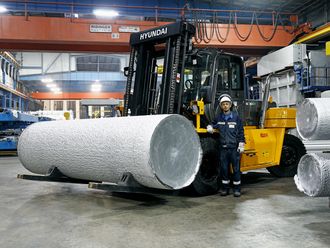Dubai: Shoppers in the UAE can expect to enjoy the benefits of a weakening euro more in the next few months if retailers choose to offer them, according to industry experts.
Consumers in the dollar-linked country can expect to see lower prices on European goods as the sliding currency allows retailers to import at a lower cost and pass their savings on to consumers. However, not all European products will be cheaper as some retailers will choose to keep the savings and widen their profit margins.
“The largest decline of the euro compared to the dirham was witnessed over last two months so the effects will be mostly seen over next half year,” said Nikola Kosutic, research manager for the Middle East at Euromonitor International.
He doesn’t expect UAE retailers to pass savings from lower import costs on to consumers.
The US dollar appreciated more than 15 per cent against the euro over the last year. The euro is expected to drop further due to the European Central Bank’s government bond-buying programme, which will see billions of new money being pumped into the euro zone economy.
The weakening euro has already affected prices of products in a few categories, including food and beverages, household, and beauty and personal care products, according to Kosutic.
Since products are ordered months in advance, prices will be set at the time of delivery.
Prices of books and magazines could drop in a few weeks, but for apparel products, prices could be impacted in four to six months, said Colin Beaton, managing director of retail consultancy Limelight Creative Services.
The weak euro also means that fewer Europeans are shopping in the UAE, retail analysts said.
Large retailers could be hedged against the drop in the euro, but smaller retailers and resellers are unlikely to do so, according to Beaton. “You’d have to be a large retailer for it to make sense to hedge. It comes with a cost,” he said.
Large retailers tend to hedge on prices of raw materials and metals, like cotton for an apparel company and gold for jewellers. But smaller retailers and resellers that choose to hedge are likely to do so on currencies, he said.
Alp Eke, senior economist at the National Bank of Abu Dhabi, said that the deflation in the euro zone and the depreciation of the euro against the dollar is likely to positively affect households and push imported inflation down.
In 2013, 25.1 per cent of imported goods in the UAE were from Europe, with Germany and the UK accounting for 5.5 per cent and 5.4 per cent of imports respectively, Eke said.
Swiss chocolates, watches to get more expensive
On a different note, Euromonitor’s Kosutic said that the Swiss franc’s appreciation against the euro is expected to boost prices of Swiss products in the UAE like watches and chocolates by an estimated 20 per cent in the coming weeks.
Retail sales in the UAE are expected to grow by 6.3 per cent in 2015 compared with 2014, slightly slower than the 7.5 per cent achieved in 2014 over 2013, mainly due to the higher number of tourists and expatriates shifting to the country, he said.
He expects retail sales to grow at a compound annual growth rate of around 6 per cent until 2019. By 2020, sales are likely to jump by more than 7 per cent, helped by the World Expo 2020, which will be held in Dubai then, attracting an estimated 25 million visitors.












